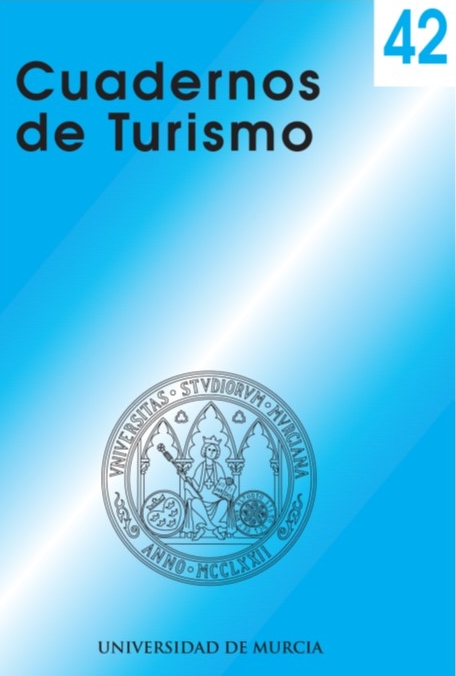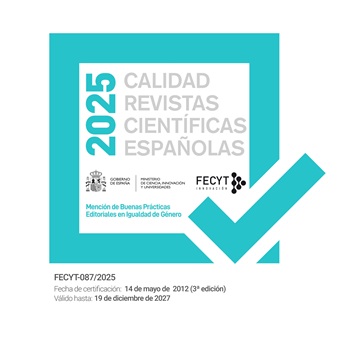Liderazgo transformacional y género en hoteles de 4 y 5 estrellas de Tijuana (México)
Resumen
Esta investigación descriptiva, que aplica la técnica de entrevista en profundidad semi estructurada, muestra las interacciones de los estilos de liderazgo y el género en hoteles de 4 y 5 Estrellas de Tijuana, México. Los resultados reflejan reconocimiento de la calidad del liderazgo de las mujeres, así como las interacciones entre estereotipos de género y liderazgo transformacional como consecuencia de la carga de trabajo de cuidados. Las gerentes prefieren un estilo de liderazgo participativo como estrategia para formar alianzas y evitar cuestionamientos sobre su capacidad de liderazgo, y como estrategia de conciliación del trabajo y la familia.
Descargas
-
Resumen2257
-
PDF1340
-
PDF 1340
Citas
AYRES, L. (2008): “Semi-Structured Interviews”, en The Sage Encyclopedia of Qualitative Research Methods (Vol. 1-2), Sage Publications, Thousand Oaks, pp. 810-11.
AVOLIO, B. J. y BASS, B.M. (1988): “Transformational leadership, charisma and beyond”, en Emerging Leadership Vitas, Lexington Books, Lexington, pp. 29-49.
BAJCAR, B., BABIAK, J., y NOSAL, C. (2015): “When leaders become strategists. A new look at determinants of leadership styles through their relationship with strategic thinking”, Procedia Manufacturing, 3, pp. 3669-3676.
BASS, B.M. (1985): Leadership and Performance Beyond Expectations, Free Press. New York.
BASS, B.M. (1997): “Does the transactional and transformational leadership paradigm transcend organisational and national boundaries?”, American Psychologist, vol. 52 (2), pp. 130-139.
BASS, B.M. y AVOLIO, B.J. (1994): Improving organizational effectiveness through transformational leadership. Sage Publications. Thousand Oaks.
BRINGAS, N. y TOUDERT, D. (2016): “Satisfacción turística del visitante fronterizo en Baja California, México”, Región y sociedad, vol. 65 (28), pp. 109-147.
BURGESS, C. (2003): “Gender and salaries in hotel financial management: it’s still a man’s world”, Women in Management Review, vol. 18 (1-2), pp. 50-59.
BURNS, J.M. (1978): Leadership. Harper Row. New York.
CHANT, S. (1997): “Gender and tourism employment in Mexico and the Philippines”, en Gender, en Work & Tourism. Routledge. London, pp. 120-179.
CUADRADO, I. (2003): “¿Emplean hombres y mujeres diferentes estilos de liderazgo? Análisis de la influencia de los estilos de liderazgo en el acceso a los puestos de dirección”, Revista de Psicología Social, vol. 18(3), pp. 283-307.
CUADRADO, I. y MOLERO, F (2002): "Liderazgo transformacional y género: autoevaluaciones de directivos y directivas españoles", Revista de Psicología del Trabajo y de las Organizaciones, vol. 18 (1), pp. 39-55.
DAI, Y-D., CHEN, K-Y. y ZHUANG, W-L. (2016). “Moderating effect of world-family conflict on the relationship between leader-member exchange and relative deprivation: links to behavioral outcomes”, Tourism Management, vol. 54, pp.369-382.
DEERY, M. y JAGO, L. (2015): “Revisiting talent management, work-life balance and retention strategies”, International Journal of Contemporary Hospitality Management, vol. 27 (3), pp. 453-472.
DÍAZ-CARRIÓN, I. A. y KIDO-CRUZ, M.T. (2017): “La participación de las mujeres en la industria hotelera con enfoque de género: un estudio de caso en la ciudad de Tijuana (México)”, El Periplo Sustentable, nº 33, pp. 192-220.
DÍAZ-CARRIÓN, I.A., VERJÁN-QUIÑONES, R. y CASTREJÓN-ALONSO, B. (2014): “El sector hotelero desde la perspectiva de género: el “techo de cristal” en hoteles de 4 y 5 estrellas en Tijuana”, Revista Turydes: Turismo y Desarrollo, no. 7(0). Recuperado de: http://www.eumed.net/rev/turydes/17/suelo-pegajoso.html (accesado el 23 de octubre del 2016).
DICICCO-BLOOM, B. y CRABTREE, B. (2006): “The Qualitative Research Interview”, en Medical Education, vol. 40 (4), pp. 314-321.
EAGLY, A.H., KARAU, S. J. y MAKHIJANI, M.G. (1995): “Gender and the Effectiveness of Leaders: A Meta-Analysis”, Psychological Bulletin, vol. 117 (1), pp. 125-145.
EISNER, S. (2013): “Leadership: Gender and Executive Style”, SAM Advanced Management Journal, vol. 78 (1), pp. 26-41.
ESCANDON-BARBOSA, D.M. y HURTADO-AYALA, A. (2016): “Influencia de los estilos de liderazgo en el desempeño de las empresas exportadoras colombianas”, Estudios Gerenciales, vol. 32 (139), pp. 137-145.
FERNÁNDEZ, M. y MARTÍNEZ, L. (2010): “Participación de las mujeres en las empresas turísticas privadas y comunitarias de Bahías de Huatulco, México ¿Hacia un cambio en el rol de género?”, Cuadernos de Turismo, nº 26, pp. 159-151.
FIGUEROA-DOMECQ, C., PRITCHARD, A., SEGOVIA-PÉREZ, M., MORGAN, N. y VILLACÉ-MOLINERO, T. (2015): “Tourism gender research: A critical accounting”, Annals of Tourism Research, vol. 52, pp. 87-103.
GUMUSLUOGLU, L. y ILSEV, A. (2009): “Transformational leadership, creativity, and organizational innovation”, Journal of Business Research, vol. 62 (4), pp. 461-473.
HORSTMEIER, C.; BOER, D.; HOMAN, A. y VOELPEL, S. (2016): “The Differential Effects of Transformational Leadership on Multiple Identifications at Work: A Meta-analytic Model”, British Journal of Management, vol. 28 (2), pp. 280-298.
INSTITUTO NACIONAL DE ESTADÍSTICA, GEOGRAFÍA E INFORMÁTICA (INEGI). (2016). “Estadísticas a propósito del Día Mundial del Turismo (27 de Septiembre). Datos Nacionales”. Aguascalientes, Ags.: INEGI. Recuperado de: http://www.inegi.org.mx/saladeprensa/aproposito/2016/turismo2016_0.pdf (accesado el 16 de septiembre del 2017).
INSTITUTO NACIONAL DE ESTADÍSTICA, GEOGRAFÍA E INFORMÁTICA (INEGI) (2015) “PIB y Cuentas Nacionales”. Recuperado de http://www.inegi.org.mx/est/contenidos/proyectos/cn/tur/default.aspx (accesado el 21 de septiembre del 2017).
INSTITUTO NACIONAL DE ESTADÍSTICA, GEOGRAFÍA E INFORMÁTICA (INEGI) (2010) “Baja California”. Censo de Población y Vivienda 2010. Recuperado de: http://www3.inegi.org.mx/sistemas/mexicocifras/default.aspx?src=487&e=2 (accesado el 23 de octubre de 2016).
INSTITUTO NACIONAL DE ESTADÍSTICA, GEOGRAFÍA E INFORMÁTICA (INEGI): (2009): Prontuario de Información Geográfica Municipal de Los Estados Unidos Mexicanos Tijuana, Baja California. México, D.F., INEGI.
INSTITUTO NACIONAL DE LAS MUJERES (INMUJERES). s-f. Indicadores de Desarrollo Humano y Género en México 2000 a 2005. Baja California. México, D.F., INMUJERES.
KATTARA, H. (2005): “Career Challenges for Female Managers in Egyptian Hotels”, International Journal of Contemporary Hospitality Management, vol. 17 (3), pp. 238-51.
LEECH, N. y ONWUEGBUZIE, A. (2006): “Field Data”, en In The Sage Encyclopedia of Qualitative Research Methods (Vol. 1&2), Thousand Oaks, Sage Publications, p. 340.
LEMOINE, G. J., AGGARWAL, I. y STEED, L.B. (2016): “When women emerge as leaders: Effects of extraversion and gender composition in groups”, en The Leadership Quarterly, vol. 27 (3), pp. 470-486.
LI, L. y LEUNG, R.W. (2001): “Female managers in Asian hotels: Profile and career challenges”, International Journal of Contemporary Hospitality Management, vol. 13 (4), pp. 189-196.
LI, L. y WANG, R. (2001): “Female Managers in Asian Hotels: Profile and Career Challenges”,en International Journal of Contemporary Hospitality Management, vol. 13 (4), pp. 189-196.
LINEHAN, M. y WALSH, J. (1999): “Senior Female International Managers: Breaking the Glass Border”, Women in Management Review, vol. 14 (7), pp. 264-272.
LUPANO, M. L. y CASTRO, A. (2011): “Actitudes desfavorables hacia mujeres líderes. Un instrumento para su evaluación”, Summa Psicológica UST, vol. 8 (2), pp. 19-29.
MARINAKOU, E. (2014): “Women in Hotel Management and Leadership: Diamond or Glass?”, Journal of Tourism and Hospitality Management, vol. 2 (1), pp. 18-25.
MAHER, K. (1997): “Gender-related stereotypes of transformational and transactional leadership”, Sex Roles, vol. 37 (3-4), pp. 209-225.
MAXWELL, G. (1997): “Hotel General Management: Views from above the Glass Ceiling”, International Journal of Contemporary Hospitality Management, vol. 9 (5-6), pp. 230-235.
McGINLEY, S. P., HANKS, L. y LINE, N.D. (2017): “Constraints to attracting new hotel workers: A study on industrial recruitment”, International Journal of Contemporary Hospitality Management, vol. 60, pp. 114-122.
MEDINA-VICENT, M. (2015): “Women’s Leadership: an essentialist concept?”, Journal of Feminist, Gender and Women Studies, vol. 2, pp. 69-72.
MINETT, D., YAMAN, H-R. y DENIZCI, B. (2009): “Leadership styles and ethical decision-making in hospitality management”, International Journal of Hospitality Management, vol. 28, pp. 486-493.
MOONEY, S. y RYAN, I. (2009). “A woman’s place in hotel management: upstairs or downstairs?”, Gender in Management: An International Journal, vol. 24 (3), 195-210.
NG, C. y PINE, R. (2003): “Women and Men in Hotel Management in Hong Kong: Perceptions of Gender and Career Development Issues”, Hospitality Management, vol. 22, pp. 85-102.
O’NEILL, J. (2012): “Using focus groups as a tool to develop a hospitality work-life research study“, International Journal of Contemporary Management, vol. 24 (6), pp. 873-885.
ORGANIZACIÓN MUNDIAL DEL TURISMO (OMT), & ONU MUJERES. (2010). “Informe mundial sobre las mujeres en el turismo 2010”. ONU Mujeres, Madrid.
PATIAR, A. y LOKMAN, M. (2009): “Transformational leadership style, market competition and departmental performance: Evidence from luxury hotels in Australia”, International Journal of Hospitality Management, vol. 28, pp. 252-262.
PÉREZ-RAMÍREZ, C., ZIZUMBO-VILLAREAL, L. y MIRANDA-CONTRERAS, S. (2012): “Incorporación al Turismo Rural y Transformación del Habitus en la Mujer Campesina de San Pedro Atlapulco, México”, Rosa Dos Ventos, vol. 4 (2), 158–177.
POWELL, G. (2011): “The Gender and Leadership Wars”, Organizational Dynamics, vol. 40, pp. 1-9.
ROSENER, J. (1990): “Ways women lead”, Harvard Business Review, vol. 68 (6), pp. 119-125.
RUIZ, G., MARTÍNEZ, O. y VERJÁN, R. (2015): “Valoración de atributos culturales e históricos en la imagen promocional de la ciudad de Tijuana como destino turístico”, El Periplo Sustentable, nº 28, pp. 31-58.
RUIZ OLABUÉNAGA, J. (2012): Metodología de la Investigación Cualitativa. Deusto. Bilbao.
SALEM, I. y KATTARA, H. (2015). “Transformational leadership: Relationship to job stress and job burnout in five-star hotels”, Tourism and Hospitality Research, vol. 15 (4), pp. 240-253.
SAMKANGE, F. y DINGANI, S. (2013): “Beyond the Glass Ceiling a Gendered and Cultural Hospitality Management Discourse on the Advancement of Women Based on Integrated Research Paradigms”, Tourism & Management Studies, vol. 9 (1), pp. 20-27.
SAMPIERI, R., FERNÁNDEZ, C. y BAPTISTA, P. (2010): Metodología de la Investigación. McGrawHill. Lima.
SCHOLZ, T.M.L. (2016): “Beyond “Roaring Like Lions”: Comadrismo, Counternarratives, and the Construction of a Latin American Transnational Subjectivity of Feminism”, Communication Theory, vol. 26, pp. 82-101.
SECRETARÍA DE TURISMO (SECTUR) y COLEGIO DE MÉXICO (COLMEX). (2011). “Análisis económico del mercado laboral en el sector turístico: hacia una política pública para la igualdad entre hombres y mujeres”. México, D.F. Recuperado de http://www.sectur.gob.mx/PDF/planeacion_estrategica/COLMEX_entregable%20final.pdf (accesado el 29 de septiembre del 2017).
SWIRSKYA, J.M., y ANGELONEA, D.J. (2015): “Equality, empowerment, and choice: what does feminism mean to contemporary women?”, Journal of Gender Studies, vol. 25 (4), pp. 445-460.
TRACEY, J.B. e HINKIN, T.R. (1994): “Transformational leaders in the hospitality industry”, The Cornell Hotel and Restaurant Administration Quaterly, vol. 35(2), pp. 18-24.
VALLES, M. (2002): Entrevistas Cualitativas. Centro de Investigaciones Sociológicas. Madrid.
TROMP, D. M. y BLOMME, R.J. (2014): “Leadership style and negative work-home interference in the hospitality industry”, International Journal of Contemporary Hospitality Management, vol. 26 (1), pp. 85-106.
WILSON, E. y HOLLINSHEAD, K. (2015): “Qualitative tourism research: Opportunities in the emergent soft sciences”, Annals of Tourism Research, vol. 54, pp. 30-47.
WOODWARD, K. y WOODWARD, S. (2015): “Gender studies and interdisciplinarity”, en Humanities Social Sciences-Palgrave Communications, 1, 15018–. https://doi.org/DOI: 10.1057/palcomms.2015.18
YANG, Y. (2011): “Gender and Engineering Career Development of Hotel´s Employees in China”, Procedia, vol. 1, pp. 365-71.
YUKL, G. (2013): Leadership in organizations. Pearson. Harlow.
Las obras que se publican en esta revista están sujetas a los siguientes términos:
1. El Servicio de Publicaciones de la Universidad de Murcia (la editorial) conserva los derechos patrimoniales (copyright) de las obras publicadas, y favorece y permite la reutilización de las mismas bajo la licencia de uso indicada en el punto 2.
2. Las obras se publican en la edición electrónica de la revista bajo una licencia Creative Commons Reconocimiento-NoComercial-SinObraDerivada 3.0 España (texto legal). Se pueden copiar, usar, difundir, transmitir y exponer públicamente, siempre que: i) se cite la autoría y la fuente original de su publicación (revista, editorial y URL de la obra); ii) no se usen para fines comerciales; iii) se mencione la existencia y especificaciones de esta licencia de uso.
3. Condiciones de auto-archivo. Se permite y se anima a los autores a difundir electrónicamente las versiones pre-print (versión antes de ser evaluada) y/o post-print (versión evaluada y aceptada para su publicación) de sus obras antes de su publicación, ya que favorece su circulación y difusión más temprana y con ello un posible aumento en su citación y alcance entre la comunidad académica. Color RoMEO: verde.





_.jpg)









